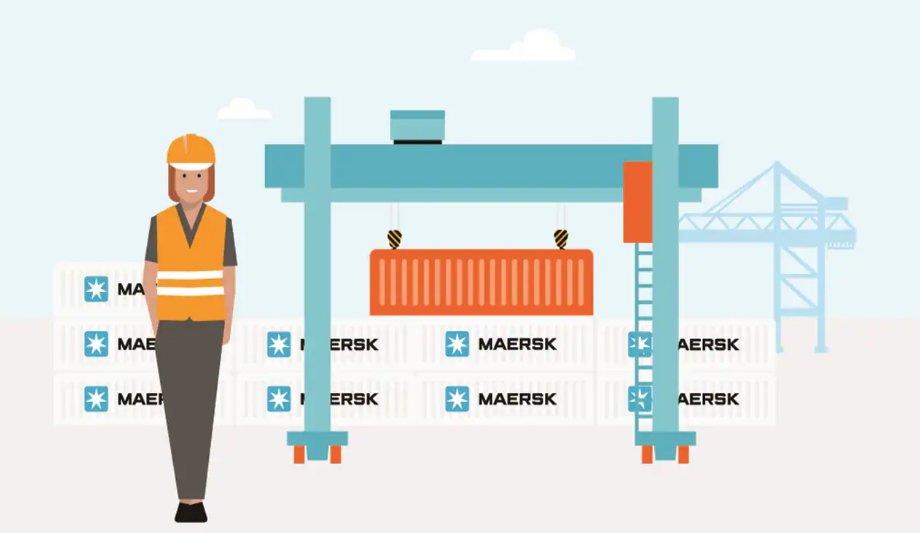From electronics to eels, from medicine to men’s fashion retail, Maersk transports everything.
Grey containers stacked neatly atop each other, huge container vessels crossing the vast oceans, and the seven-pointed white star. All these come to mind when one thinks of global container shipping company Maersk. This is Maersk’s legacy, a legacy that is nearly 100 years old.
Over the last four years, though, the company has taken a strategic decision to change course. Forward-looking as always, Maersk has pivoted around next-gen technologies, big data, and innovation to transform into an end-to-end integrated logistics company. This is having a positive impact on the global supply chain and logistics ecosystem.
Importers, for instance, are benefiting from Maersk’s Destination Supply Chain Management (DSCM) solution, which provides greater visibility into the entire supply chain. An importer can now get a clear view of all stages in the supply chain – from cargo planning to delivery – making it possible to overcome typical blind spots that often pose a challenge, especially to control costs and plan inventory more efficiently.
The tectonic shift
Consumer behaviour has undergone a dramatic shift over the past few years due to e-commerce. Key reasons for this change include the convenience of shopping online, extensive product choices, seamless omnichannel experience, and same-day delivery options. For importers, this change meant they needed to put in place just-in-time inventory and forecast demand around ever-evolving customer behaviour and needs. The pandemic-induced lockdowns in 2020 accelerated this digital adoption, upended global supply chains
The pandemic-induced lockdowns and social distancing norms in 2020, which accelerated this digital adoption, upended global supply chains. Importers that were reliant on a sole supplier saw their inventory dry up. Others with decentralised operations had to cope with goods being stuck at different ports across the world as the pandemic played out.
Disruptions such as this highlight the importance of forging partnerships with technology-driven integrated logistics players that can provide end-to-end visibility into all aspects of the supply chain.
The digital imperative
Today, Maersk can manage the entire product journey, including booking, customs clearance, warehousing, inter-modal transport, cargo insurance, etc. An importer based in a remote location near Chennai can now get real-time insights into their cargo (for example, semi-finished electronic goods).
DSCM provides a dashboard view tracing cargo movement through and through. From creating invoices and other documentation to exception management to customs clearances at ports of call during the transit to efficient in-country logistics, technology and the Maersk team of specialised experts seamlessly come together to ensure there is no bottleneck along the journey.
Accurate inventory planning
Maersk understands the challenges and characteristics of the industry, whether it is fashion and lifestyle or toys or high-end electronics or chemicals. Irrespective of the industry domain, Maersk DSCM provides the sort of visibility that makes accurate inventory planning a reality, besides helping one optimise costs. Integrating APM Terminals Inland Services into Maersk Logistics and Services have paved the way for end-to-end solutions
Solutions such as spot rates reduce overbooking cycles while also providing a price and cargo loading assurance. Given the challenge with space, customers now certainly have an advantage in terms of their logistics planning when they partner with Maersk. The integrated logistics company simplifies the overall booking experience of EXIM traders. Decisions such as integrating APM Terminals Inland Services into Maersk Logistics and Services have paved the way for end-to-end solutions to its customers.
The customer advantages
Maersk’s network of subsidiaries, which is spread across the globe, enables it to offer dedicated end-to-end supply chain expertise across different industries and different geographies. Using Maersk DSCM, one immediately gains benefits as an importer that include the ability to:
- Decentralise the network and experiment with alternative procurement strategies.
- Build just-in-time inventory.
- Forge stronger relationships with the suppliers due to the clear visibility that begins from the place of the product’s origin.
- Let Maersk be the extended team in remote locations where one doesn’t have any physical presence.
- Ensure that the compliance process is hassle-free as the Maersk team single-handedly takes care of customs clearance, by having the right documentation and the right quantity and quality.
- Upgrade the supply chain with Maersk technology capabilities, which will help one to transform the supply chain digitally.
As sourcing patterns become diversified, supply chains need to become more resilient. Now, more than ever, it is imperative for one to have a globally spread supplier network. With Maersk as the end-to-end supply chain and logistics partner, one can confidently focus on the business, decentralise the supplier network, and gear up for greater growth.










